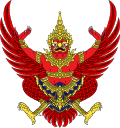| | ||||||||||||||||||||||||||||||||||||||||||||||||||
| ||||||||||||||||||||||||||||||||||||||||||||||||||
All 219 seats in the House of Representatives 110 seats needed for a majority | ||||||||||||||||||||||||||||||||||||||||||||||||||
| Turnout | 49.16% ( | |||||||||||||||||||||||||||||||||||||||||||||||||
|---|---|---|---|---|---|---|---|---|---|---|---|---|---|---|---|---|---|---|---|---|---|---|---|---|---|---|---|---|---|---|---|---|---|---|---|---|---|---|---|---|---|---|---|---|---|---|---|---|---|---|
This lists parties that won seats. See the complete results below.
| ||||||||||||||||||||||||||||||||||||||||||||||||||
 |
|---|
| |
General elections were held in Thailand on 10 February 1969. The military-backed United Thai People's Party emerged as the largest party, winning 75 of the 219 seats in the House of Representatives. Voter turnout was 49%. [1] Following the election, 30 of the 72 independents joined the UTPP, giving it a total of 105 seats, whilst 24 formed the Liberal Independent Party. They were the first elections in which a number of members were not appointed by the king.
